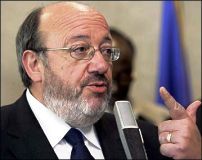EU resumes aid to Sudan after end to long-running war
BRUSSELS, Jan 25 (AFP) — The European Union reopened its financial aid taps to Sudan during a landmark visit by top government and rebel leaders to celebrate a peace accord that has ended one of Africa’s longest-running wars.

|
|
Louis Michel, European UnionCommissioner for Development and Humanitary Aid, gestures during a press conference in Brussels. Michel said the EU was immediately extending 50 million euros in aid to Sudan, equally divided between the north and south.(AFP). |
This month’s agreement between the Muslim-dominated government in Khartoum and the southern Sudan People’s Liberation Movement (SPLM) could provide a blueprint to ending the bloody conflict in Darfur, officials said.
First Vice President Ali Osman Taha and Nhial Deng Nhi, the SPLM’s commissioner for external relations, witnessed the signing of an accord that reopens EU-Sudanese cooperation after a 15-year hiatus.
EU aid commissioner Louis Michel said the 25-nation bloc was immediately extending 50 million euros in aid — equally divided between the north and south — “to show the people of Sudan … that there is a dividend to peace”.
The money is part of a 450-million-euro package that the European Commission stands ready to disburse in Sudan — provided the agreement between the government and SPLM sticks, and peace is restored to the region of Darfur.
“This is a first step, but it is a very important step,” Michel told reporters after signing the “country strategy paper” with Sudanese officials.
The legislative body of the SPLM on Monday unanimously ratified the January 9 peace deal signed between the Muslim-dominated government and the southern rebel group to end 21 years of war.
Some 1.5 million people died and another four million fled their homes during the civil war in mainly Christian south Sudan, Africa’s longest conflict since the end of a 27-year war in Angola in 2002.
International concern about Sudan has now focussed on the western region of Darfur, where about 70,000 people are estimated to have been killed and 1.5 million others made homeless in attacks by government-backed militias.
An uprising begun by ethnic minority rebels in early 2003 prompted the government to launch a bloody crackdown by the Arab militias which Washington has said amounts to genocide.
But Taha said his government was serious about peace in Darfur, and hoped that the accord with the SPLM would act as inspiration.
Under that deal, the government and the southern rebels have agreed to come together in a government of national reconciliation, to decentralise power from Khartoum and to increase the powers of local administrations.
“The peace agreement has provided clearly for a number of concepts and principles that govern the issue of power-sharing and wealth-sharing, not only between north and south but for the whole of the country,” Taha said.
“We are committed to using the same drive and our experience in resolving the conflict in south Sudan to bring a prompt and fair answer to the conflict in Darfur,” he said.
Deng added: “The SPLM, as one of the key political players of the Sudanese landscape, will be lending its efforts and weight as part of the broad-based government of national unity to efforts to find a solution in Darfur.”
Michel said the EU would “stay committed for all the efforts for peace that have to be made”.
Provided progress is made in Darfur, the EU aid package would be used to safeguard the delivery of food aid, for education, internal refugees and to build up Sudanese administrative institutions.
The SPLM official said that with the EU’s help, the Sudanese people were “solidly united to face the challenges that are in front of them”.
Taha said the government hoped other international donors would come to Sudan’s aid at a conference planned for April in Oslo, notwithstanding the relief effort for the victims of Asia’s devastating tsunami.
